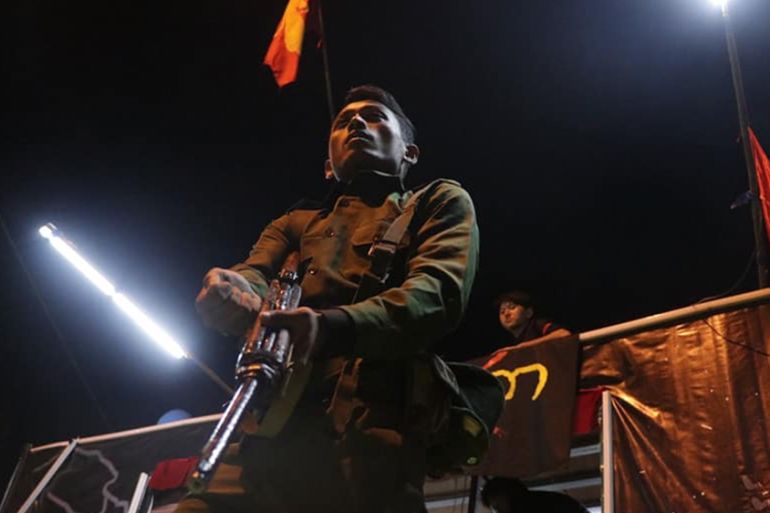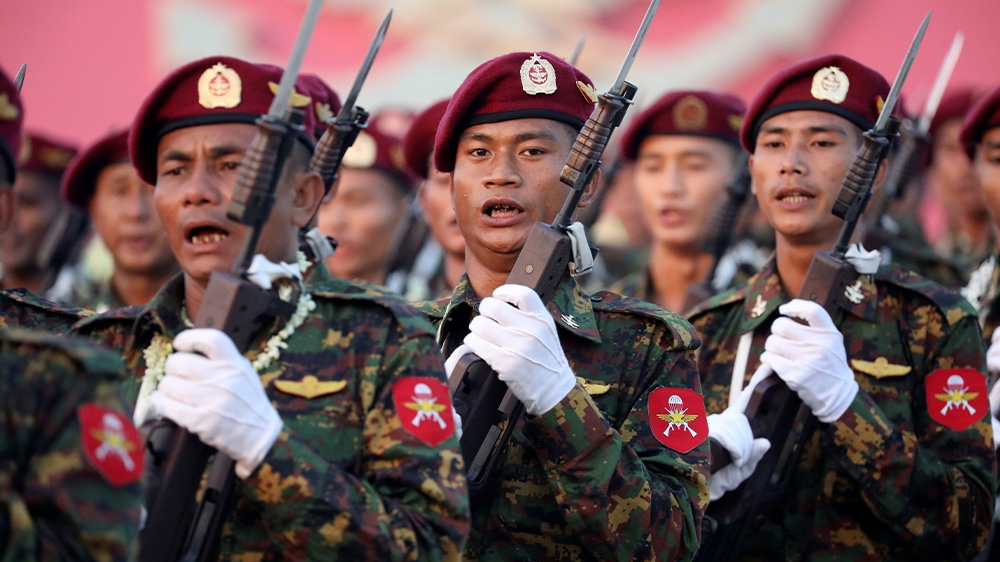Gagged: Performers face jail in Myanmar for raucous satire
Five members of the Peacock Generation were given one-year prison sentences at a Yangon court on Wednesday.

Yangon, Myanmar – They might be facing several years in a Myanmar prison, but the satirists from the Peacock Generation troupe have not allowed it to dampen their mood.
The seven were arrested in April and May after taking to the streets of Yangon to poke fun at the country’s powerful military, singing and chanting to raucous music in front of delighted audiences.
Keep reading
list of 3 itemsUS slaps sanctions on Myanmar army chief over Rohingya abuses
Myanmar military committing war crimes in Rakhine: Amnesty
They were performing “thangyat”, a traditional ensemble show that blends poetry and dancing and has been used to mock the country’s leaders since the 19th century.
At one point a performer in a soldier’s uniform moved solemnly around the stage to an old patriotic song about the military. Then the music suddenly stopped and a jingle for Mytel, a phone operator part-owned by the military, blared through the speakers while the soldier broke into a dance.
The gag channelled popular anger about the military’s tight grip on large swathes of the economy. When the troupe live-streamed their performance on Facebook, the generals were unable to see the funny side and decided to prosecute them.
Five members of the troupe were given one-year prison sentences at a Yangon court on Wednesday under a law that forbids inducing military officers “to disregard or fail” in their duties.
The proceedings have been complicated, with some members of the group travelling between two different courts to defend against two different charges and others only facing one charge.
Wednesday’s ruling will only mean the end of proceedings for two people. The others will not know their final fates until next month when they will have to attend more rulings.
Three of those sentenced today could still get two more years for breaching an online defamation law.
Lieutenant Colonel Than Tun Myint, the plaintiff who pressed charges against the performers, addressed media outside the courtroom following the verdict.
Dressed in his uniform, he dismissed testimony from the defendants that had argued their imprisonment breached their human rights.
“They should have respected others’ rights too,” he said.
All seven have already been held for months at Yangon’s Insein prison after being denied bail.
In a statement on Wednesday, Amnesty International’s research director for Southeast Asia, Joanne Mariner, denounced the verdict as “appalling”.
“Punishing people for performing a piece of satire speaks volumes about the dire state of freedom of expression in Myanmar.”
Controversial tradition
Meanwhile, the young performers remain defiant, and have hung on to the boisterous energy they brought to their shows in April.
“Am I scared? No!” said 24-year-old Su Yadanar Myint, giggling, when asked at a court hearing on Tuesday if she feared a prison sentence. She will hear the final ruling in her case next month.
“It’s nothing to be scared of … we can read books, we get to stay privately just with other political prisoners.”

Thangyat, performed during Myanmar’s April New Year celebration, traditionally serves as a vehicle for communicating uncomfortable truths to the country’s leaders.
“It’s a tradition that lets the people tell the government and the rulers what is happening in the country, what has to be done and what has to be fixed,” said Zeyar Lwin, 29, another of the defendants who was sentenced today.
The military junta tolerated the performances for a while after taking power in a 1962 coup, but then banned them in 1988; the same year they killed thousands of protestors in a bid to stamp out a mass student-led uprising.
The tradition was permitted again by a reformist military-backed government in 2013, but performers were still compelled to submit their lyrics to censors for approval.
And while the government of former dissident and human rights icon Aung San Suu Kyi ended censorship of thangyat lyrics when it came to power in 2016, it reintroduced it the following year.
“We have to have freedom of expression parallel with rule of law,” Myo Nyunt, a spokesman for Suu Kyi’s National League for Democracy party told Al Jazeera. “We have to balance them, nothing can be reached at the edge.”
Forced onto the streets
Now, troupes that refuse to get approval from censors are barred from performing inside venues, which is why the Peacock Generation was among those to hold their shows on the streets.
“We didn’t submit anything to the censorship committee because we want freedom of expression,” said Su Yadanar Myint. “The censors would have cut lots of the lyrics.”
It is unlikely the ensemble’s crude critiques of the military’s continued role in politics would have survived the red pen.
They should grow a thick skin so they can actually listen to what younger people think about them.
At one point in the show the performers referred to unelected military legislators, who are guaranteed 25 percent of all seats in parliament, as “25 cow sh**s in a beautiful garden,” Su Yadanar Myint said.
Another lyric demanded that generals be sent to the International Criminal Court or ICC. “That’s one of the ones they hated the most,” said Zeyar Lwin.
Myanmar’s military has faced repeated international calls for its generals to be prosecuted for genocide after they ordered attacks against the Rohingya minority in 2017 that are believed to have killed thousands.
United Nations experts and several major rights groups have also called for accountability for alleged war crimes against other ethnic minorities, including in Kachin and Shan states.
The military has vehemently rejected the UN panel’s findings.
Brigadier General Zaw Min Tun, a military spokesman, told Al Jazeera the Peacock Generation’s performance “created misunderstandings between the public and the military.”
“That’s not really good for the dignity of the military,” he added.

Young speak out
Thinzar Shunlei Yi, a prominent youth activist, encouraged Myanmar’s generals to embrace the thangyat tradition.
“They should grow a thick skin so they can actually listen to what younger people think about them,” she said.
More established and older performers often steer clear of controversial material, she added, meaning it is often only political activists used to the threat of jail who are willing to perform hard-hitting satire.
“In Myanmar there are many things that our renowned artists and comedians don’t really talk about. It’s only young activists who speak up,” she said.
Part of the reason the Peacock Generation performers are able to stay so upbeat is that some of them have been jailed before for their activism, so they know how to look out for each other, said Zeyar Lwin, who spent nine months in jail in 2015.
They have also protested for better conditions, including the right to meet their families after court hearings and to be allowed a short break from their handcuffs before being sent back to prison.
Even so, Su Yadanar Myint says that when she gets out she plans to tone down the lyrics to her performances to avoid being arrested again.
“We’ll have to sing more beautifully, less directly,” she said. “Not just ‘go to the ICC’ or stuff like that.”